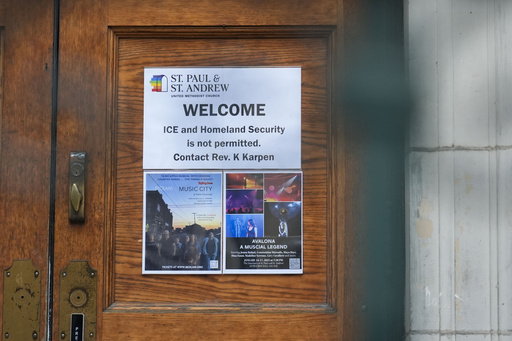WASHINGTON — In a significant shift regarding immigration enforcement, officials will now have the authority to arrest migrants at sensitive sites including schools and churches. This decision, announced recently, overturns long-standing policies that previously placed limits on where federal immigration agents—specifically Immigration and Customs Enforcement (ICE) and Customs and Border Protection (CBP)—could conduct their operations. The current administration is working to fulfill campaign commitments aimed at enforcing stricter immigration laws and expediting deportations.
The Department of Homeland Security indicated that Acting Secretary Benjamine Huffman issued this change in policy. For over a decade, guidelines had served to protect sensitive locations from immigration enforcement activities, with ICE introducing their own restrictions back in 2011 and CBP following suit in 2013. The administration insists this new directive empowers officers to remove individuals deemed as threats, including serious offenders. “Criminals will no longer find refuge in America’s schools and churches,” the Department stated.
An emphasis on immigration crackdowns has been a hallmark of the current administration, echoing similar themes from its earlier term from 2017 to 2021. Recent executive actions reflect this priority, encompassing measures such as ending access to a program that previously aided numerous migrants’ entry, halting the refugee program, and enhancing collaboration between local law enforcement and federal immigration authorities. The administration has framed these efforts as a way to restore the power of ICE agents, who they believe had been hampered by previous Biden-era guidelines.
While this policy update was anticipated, it has generated considerable concern among advocates. Many fear that the heightened risk of deportation within places traditionally viewed as safe spaces for families, like schools and health facilities, could deter migrants from necessary services. Olivia Golden, interim executive director of the Center for Law and Social Policy, expressed that the potential consequences for immigrant families could be dire: they might avoid seeking critical medical care or enrolling children in school due to fears of arrest.
Historically, enforcement activities within “sensitive locations” were restricted unless in cases of emergency or national security, requiring prior approval for any operations. Although the Trump administration maintained similar restrictions initially, they later lifted them for court-related settings, which were reinstated under Biden’s leadership, alongside updates that further defined where ICE and CBP could operate.
Many educational institutions across the country have been proactive, reaching out to immigrant families and coordinating with local law enforcement to develop responsive policies. In California, schools have shared regulations that specifically limit local authorities’ involvement in immigration enforcement. A representative from the Fresno Unified School District commonly stated that immigration enforcement typically wouldn’t take place on their campuses unless backed by a valid court order.
In Chicago, the Board of Education passed a resolution affirming that schools would not assist ICE in immigration matters and that agents would need a criminal warrant to enter school premises. For years, churches have served as sanctuaries for migrants aiming to avoid detection by ICE, with numerous individuals taking refuge within their walls since 2014.
Pastor K Karper from St. Paul & St. Andrew United Methodist Church in New York expressed his commitment to providing sanctuary. He recently placed signage to notify officers that they would not be welcomed in the church without proper warrant authorization. “As part of our religious mission, we strive to offer safety to newcomers and others, irrespective of their immigration status,” he remarked.
Karper emphasized that the church community will convey clearly to any federal agents that their presence without a warrant would not be tolerated. “We want those inside to know that they have rights and are not obligated to answer questions or provide identification in the absence of a warrant,” he stated, reinforcing a sense of rule of law and civil rights within the community.



